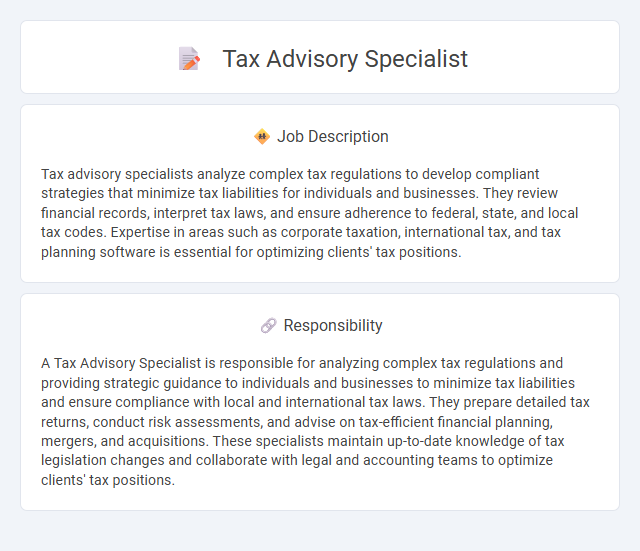
Tax advisory specialists analyze complex tax regulations to develop compliant strategies that minimize tax liabilities for individuals and businesses. They review financial records, interpret tax laws, and ensure adherence to federal, state, and local tax codes. Expertise in areas such as corporate taxation, international tax, and tax planning software is essential for optimizing clients' tax positions.
Individuals with strong analytical skills and attention to detail are likely to be well-suited for a Tax Advisory Specialist role due to the complex nature of tax regulations and compliance requirements. Those who demonstrate patience in interpreting evolving tax laws and enjoy problem-solving in a client-focused environment may find this career fulfilling. Conversely, people who prefer routine tasks with minimal interaction or struggle with regulatory complexities might find this position less compatible with their strengths.
Qualification
A Tax Advisory Specialist typically requires a degree in accounting, finance, or law, complemented by certifications such as CPA (Certified Public Accountant) or CTA (Chartered Tax Adviser). Expertise in tax codes, regulations, and compliance is essential, alongside proficiency in tax software and analytical skills to interpret complex financial data. Relevant experience in tax planning, auditing, and risk management enhances a candidate's qualifications for this specialized role.
Responsibility
A Tax Advisory Specialist is responsible for analyzing complex tax regulations and providing strategic guidance to individuals and businesses to minimize tax liabilities and ensure compliance with local and international tax laws. They prepare detailed tax returns, conduct risk assessments, and advise on tax-efficient financial planning, mergers, and acquisitions. These specialists maintain up-to-date knowledge of tax legislation changes and collaborate with legal and accounting teams to optimize clients' tax positions.
Benefit
Tax advisory specialists likely provide valuable insights that help individuals and businesses minimize tax liabilities while ensuring compliance with evolving regulations. Their expertise probably enhances financial planning efficiency, reducing the risk of costly penalties and audits. Working with a tax advisory specialist may increase the probability of maximizing available deductions and credits, contributing to overall financial savings.
Challenge
A Tax Advisory Specialist faces the challenge of navigating complex and constantly changing tax regulations to provide accurate guidance. They must adapt quickly to new laws and interpretations, which requires continuous learning and analytical skills. The role likely demands balancing compliance with strategic tax planning to minimize risks and optimize financial outcomes.
Career Advancement
A Tax Advisory Specialist plays a pivotal role in providing expert guidance on tax regulations, compliance, and strategic planning to optimize financial outcomes for clients. Mastery of evolving tax laws and proficiency in analytical tools enhance opportunities for career advancement into senior advisory, managerial, or consulting roles within accounting firms, corporations, or government agencies. Continuous professional development through certifications like CPA, CMA, or CTA significantly boosts prospects for leadership positions and higher remuneration.
 kuljobs.com
kuljobs.com